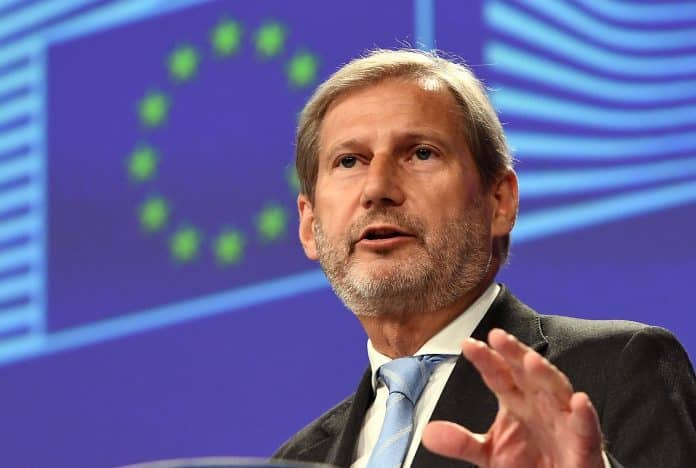
The EU’s budget commissioner has called on member states to back new taxes including an annual levy on 70,000 big companies to access the single market, as part of a package of measures to help fund the bloc’s recovery.
Johannes Hahn told the Financial Times that there was no practical alternative but to hand the European Commission new sources of direct revenue — or “own resources” — to service the debt it would take on under the €750bn recovery plan unveiled last week. These could include a mooted €10bn annual levy that Mr Hahn said would affect 70,000 companies in Europe with global turnover exceeding €750m.“What we are aiming at is — at the latest by the end of 2027 — that we will have a functioning, steady flow of new own resources to our budget,” the commissioner said in an interview, adding that he was ultimately targeting €15bn-€20bn a year.
The only options other than raising these new revenues would be a politically unacceptable squeeze on spending or higher budget contributions by the member states, he explained. “I don’t see real alternatives,” he said. “A smaller budget will not be acceptable for the huge majority of member states. And concerning future contributions, I do not see appetite [from] anybody.” The proposals would make the EU budget less dependent on the national contributions that make up the overwhelming majority of the bloc’s revenues. But the plans would face formidable political obstacles; EU states have traditionally been deeply wary of creating new own resources on top of existing ones, such as customs duties. Ursula von der Leyen, European Commission president, last week called for new own resources as part of plans for the €750bn recovery fund, which she hopes member states will put at the heart of their common response to the crisis.
We are not financing past debts, we are not providing budgetary support, we are raising money at the capital market in order to invest in the recovery and resilience of our countries and companiesJohannes HahnThe levy on large companies, which is at a very early stage of discussion in the commission, would take the form of an annual lump sum payment for using the single market. The scale of this “access fee” would vary depending on the company’s size, Mr Hahn said, adding that large enterprises could be divided into two or three categories.It is part of a menu of possible revenue-raising options including a carbon border adjustment levy, revenue from an expansion of the bloc’s emissions trading scheme, and a tax on digital companies. Mr Hahn insisted the new tax proposals “do not target individual taxpayers, but on the other hand fit perfectly into our political priorities” — such as addressing climate change. He dismissed suggestions from some commentators that the new tax and debt plans represented a “Hamiltonian moment” in which the EU leaps towards a fully fledged fiscal union similar to the jump under then-US treasury secretary Alexander Hamilton in 1790.“What we are doing here is strictly time-limited, it is not introducing something by the backdoor,” he said, insisting there would be a de facto sunset clause on the new borrowing in 2024. “It is the dimension which is maybe making some people nervous, but we are not financing past debts, we are not providing budgetary support, we are raising money at the capital market in order to invest in the recovery and resilience of our countries and companies. It should be seen as an investment.” He emphasised that the spending would be accompanied by reforms in individual member states, making them less reliant on the support of others in the case of future crises. “It is not sustainable if a country is always asking for support because they are not able to finance the recovery on their own. It is a kind of wake-up call for some countries.”
Among the key barriers to the plan is opposition among so-called frugal countries — Austria, Denmark, the Netherlands and Sweden — to the idea that the commission hands out grants to struggling member states using borrowed money. However Mr Hahn, who is Austria’s commissioner, argued that the frugal countries benefit disproportionately from the single market and so should swing behind the proposals. The investments and reforms triggered by the recovery fund should make European member states and companies “more resilient, more fit, and better equipped for a future crisis”, he argued. This would be in the interests of the whole bloc. “If you look into the past, some countries were always more affected by a crisis than others — and usually the same ones,” he said.“We are talking so much about convergence, solidarity: this means to help those who have more problems currently or in the past to improve the situation in order to be better prepared, and less dependent on the support of others in case there is another crisis.”

















